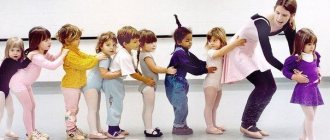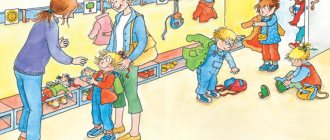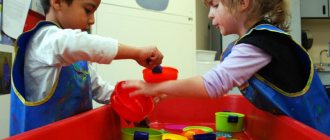It is especially difficult for young children to get used to the conditions of a preschool institution.
They are still too attached to their mother and are afraid of everything new and unfamiliar. Every child, when visiting a kindergarten, experiences difficulties during adaptation - the body’s getting used to life experiences that are different from early ones.
From the first days of life at home, the child is instilled with special rules - a certain sleep and wakefulness schedule, types of activities, nutrition, the nature of relationships with others, prohibitions, etc.
During adaptation to the nursery, the child’s behavior and reactions change - the baby cries a lot and gets irritated, eats less and less often, sleeps poorly, loses already acquired skills, and often gets sick. However, such symptoms are a natural reaction to new living conditions.
The nursery is an unknown space, new faces, a hierarchy of relationships. The adaptation process requires a lot of mental energy and physical strength. Features of addiction depend on the individual and personal qualities of the child.
To facilitate this process and reduce the impact of traumatic factors, it is important to prepare the child for changes in advance, and provide comprehensive assistance and support throughout the entire period of adaptation.
How is the period going?
Adaptation of children to nurseries goes through several periods, characterized by the severity of certain negative reactions.
Acute phase .
At the first stage, maximum mobilization of the child’s body is observed. The baby is constantly in an excited, tense state. He is whiny, nervous, capricious, hysterical both within the walls of a preschool educational institution and at home.In addition, physiological changes related to heart rate or blood pressure can be observed. At this stage, susceptibility to all kinds of infections and viruses increases.
- Moderately acute phase . The severity of negative manifestations noticeably decreases, the baby gradually adapts to the changed living conditions. There is a decrease in excitability, nervousness, improved appetite and sleep. However, at any stage of this phase, a resumption of negative emotions is likely - hysterics, tearfulness, reluctance to part with parents.
- Compensated phase . Characterized by stabilization of the mental state. The child successfully finds ways to interact with the teacher and peers and actively begins to learn new skills.
Adaptation cannot be avoided - it is the body’s natural reaction to changed conditions. Some children successfully cope with stress in a few weeks, while others remain in emotional stress for several months.
Difficulties
Adaptation to new living conditions at an early age is complicated by age-related developmental characteristics . Children have not yet fully developed the mobility of nervous processes - they are less mobile, it is difficult to distract them or interest them in a new toy.
Not all children have time to master the methods of verbal interaction - therefore, they do not always correctly perceive the speech of an adult addressed to them. Kids cannot boast of experience communicating with different people; it can be extremely difficult to calm them down.
Games for children from one year old
- put items in a box or basket and put them back;
- build “towers” from several cubes;
- collect pyramids;
- roll cars;
- “musical” exercises: knocking objects against each other, ringing a bell, etc.
- finger games: we make different movements with our fingers and hands, pronouncing special nursery rhymes.
All these games remain at an older age, but gradually become more complex.
What schemes exist?
Practice has made it possible to develop certain schemes for including children in the nursery group. Each parent must decide on the appropriate option, based on the personal characteristics of their baby.
Preliminary preparation
Many parents begin to live according to the kindergarten regime long before the first day of their stay:
- early rise;
- similar menu;
- lunchtime nap;
- familiarization with different types of activities;
- organizing interaction with peers (for example, on the playground);
- leaving the child with other relatives or close friends.
The advantage of this approach is that the child gradually gets used to the alternative reality in advance. He understands that home and mother, familiar toys are not the only thing in this world. The baby readily begins to show cognitive interest in an unobtrusive environment .
The disadvantage of this adaptation scheme is expressed in the confusion of concepts - the baby will not see the difference between being at home and in a nursery if he begins to live according to a 24-hour schedule. Psychophysical relaxation after visiting kindergarten is also important and necessary.
Visiting mode
Some parents prefer to introduce their baby to a new environment gradually - going a couple of times a week for several hours . On the one hand, the child will feel comfortable this way, on the other hand, there will be capriciousness, unwillingness to follow the rules, regime, and any requirements that contradict their own wishes.
Other adults prefer to place the child in a nursery for the whole day and take him to preschool systematically, without absences or absenteeism for a good reason.
Of course, such actions will shorten the adaptation period, but they can also cause irreparable harm to the child’s mental health.
Escort
Some parents prefer to be nearby. Thus, children, seeing the presence of an adult in close proximity, certainly experience being in a new territory more easily. However , this does not exclude the aggravation of the situation when joint attendance at kindergarten naturally stops.
When choosing a particular behavior strategy, you should rely on the individual characteristics of the baby. If a child is energetic and active, explores the world around him with enthusiasm, and has experience communicating with peers, there is no need for overprotection.
If the baby is reserved, avoids everything new, and is overly attached to the mother, then the adaptation process should be approached with understanding and everything should be done to make the baby as comfortable and calm as possible.
Specialized groups
The division of children in preschool educational institutions is carried out not only by age, but also by purpose and nature of stay.
The mental characteristics and physiological state of the child are also taken into account. Today, the following specialized groups operate in Russian kindergartens:
- GKP or short-term stay . They are rare in preschool educational institutions. They are intended for those children whose parents are not yet ready to leave for the whole day. As a rule, such a group includes no more than 15 people. This allows you to implement an individual approach to the development of the baby. In some kindergartens, the GKP is combined with a regular group;
- speech therapy Suitable for children who have problems with pronunciation. Speech therapists work with the children. The purpose of the classes is to correct speech defects and enrich vocabulary;
- for children with disabilities . The group is distinguished by its heterogeneity. It is attended by children with visual and hearing impairments, and problems with the musculoskeletal system. Children with developmental delays and various emotional disorders are also included here. Specialists work with children to help them eliminate the disorder and acquire the necessary level of knowledge;
- summer _ This is a multi-age temporary group of preschool educational institutions. Created for the summer. The emphasis is on entertainment rather than education. Hiking, outdoor games, and excursions are organized for children.
How to behave as an adult?
Both the teacher and the parent can contribute to a favorable adaptation to the nursery. Appropriate help and support can alleviate the psycho-emotional state of the child.
The main task of the parent is to prepare the baby in advance for visiting the nursery.
You cannot place a child in an unfamiliar environment just like that, without prior preparation.
- It is advisable to start the stay in a preschool institution with several hours and subsequently increase this time gradually.
- Parents are advised to teach their child all the rules of personal hygiene at home. This will make it easier for him to get used to the teacher’s requirements.
- It is advisable to develop a certain diet, give up snacks, and also instill skills in using cutlery. It is important to explain to the child that he needs to eat the whole portion - otherwise he simply will not have enough energy, and he will not be able to explain the physical discomfort he experiences.
- Daytime naps are an integral part of preparing to attend kindergarten, and you will also have to get used to this. Children sleep in nurseries because their leisure time is dynamic, rich, and varied. If a child refuses to nap at home during the day, you should take a more responsible approach to organizing your free time.
- Clothes and shoes should be comfortable and practical. The baby should not be afraid to get it dirty or wrinkled. Movements should not be constrained, and if necessary, the child should be able to take care of himself independently - it is advisable to abandon complex lacing, fasteners, and fastenings.
- You should be allowed to take with you to the nursery only those toys that he is ready to share and that he does not mind spoiling or losing.
We must not forget that deception, even due to a sharp change in circumstances, can become a very difficult truth for a child, shake his trust in his parent and negate all efforts to successfully adapt to the kindergarten.
The teacher also plays an important role in the child’s adaptation process. The quality of interaction with the baby and with the parents affects how the whole process will go overall and how quickly it will end.
In order for the adaptation to be painless, the teacher, first of all, needs to establish contact with the parents and agree that they bring the children at intervals of 10 minutes. This will allow you to meet each child and find a common language with him, making the process of parting with the parent easier.
It is important to establish trusting relationships with children so that they feel safe:
- show affection, kindness, interest;
- offer help;
- smile more often;
- tactile contact;
- involvement in group games;
- inquire about your mood and well-being.
The interior of the room should be cozy - decorative items, corners for privacy, a clean, soft carpet, a variety of toys.
Speech therapy
Children are recruited into speech therapy groups by a speech therapist based on preliminary testing and after a thorough examination. The ONR group includes children with general speech disorders, the FNR group includes children with problems in pronouncing certain sounds.
Pupils, in addition to the main classes, engage in special exercises with a speech therapist and teacher aimed at improving and improving their speech.
In such groups there are usually not many children - 10-12 people. Classes with a speech therapist can be individual or group, and are conducted according to a schedule. All other classes are conducted according to a simplified and facilitated plan, acceptable for children with such defects.
Mistakes of parents and educators
The main mistake parents make when moving to a preschool is trying to influence the child without paying attention to the obvious demonstration of negative reactions.
Many children are literally brought to the kindergarten by force - in tears and hysterics. For a child, such circumstances become psychologically traumatic.
Most parents are seriously busy with work, but this is not a reason to show disinterest, not communicate with the child on the way home, or not ask about the day spent in the garden.
Kids want and need:
- share emotions;
- experience;
- receive approval from others.
The teacher must find an individual approach to each child, because subsequently the teacher becomes a second mother for the children, a significant adult to whom they can always turn for help.
If a child is aloof and uninitiative all day, it is important to give him special attention. The fundamentally important task of any teacher is to tirelessly monitor the behavior, mood, and well-being of each child.
A negligent attitude towards their physical or mental health can provoke the development of serious disorders.
Games from one to three years
At this age, new games are quietly added and those already used become more complex.
- sorting objects according to different criteria - color, shape, size, etc.
- Lego constructor from large parts, thematic lotto, dominoes with pictures, nesting dolls, puzzles and much more.
Separately, it is worth mentioning story games. They can play out different situations - “birthday”, “shop”, “hospital”, “cooking” and much more, as well as plots of fairy tales and songs familiar to the child.
Do we even need a nursery?
Each parent has the right to independently decide when to take their child to kindergarten and whether to do it in principle.
Early adaptation is much more difficult; failure to understand the seriousness of what is happening can lead to all sorts of negative consequences .
On the other hand, early attendance at kindergarten, if all recommendations are strictly followed, will help ease the further transition to school and make the child more independent. In kindergarten, all conditions are created for full, comprehensive development, similar indicators of which are difficult to achieve at home.
Young children naturally cause particular concern among parents, so many of them simply refuse to attend nurseries in order to maintain mental well-being.
If at least one of the parents has the opportunity to pay attention to the child at home - organize useful leisure time, instill self-care skills, engage in training and education, provide conditions for the child to interact with peers, refusal from the nursery may be justified.
In all other cases, visiting kindergarten is a useful, vital experience that every child needs.
Older
The senior group of the kindergarten is attended by children aged 5 to 6 years. Classes are already becoming more intense, in-depth and longer – 25 minutes each.
In addition to the basic ones, classes can be held on the history of the native land and basic handicraft skills can be instilled.
Children can already perform simple exercises from sports such as gymnastics, basketball and some others.
The toys in the group should be varied and age-appropriate: mosaics, puzzles, three-dimensional construction sets with many details.
Children are also taught housekeeping skills. Therefore, among the toys there should be miniature doll gas stoves, cutlery, an ironing board with a toy iron, brooms, dustpans and brooms. You can invite children to care for indoor flowers, aquarium fish, and parrots.
“Christmas”, “Defender of the Fatherland Day”, “Easter”, “Victory Day” are added to holidays and matinees.





